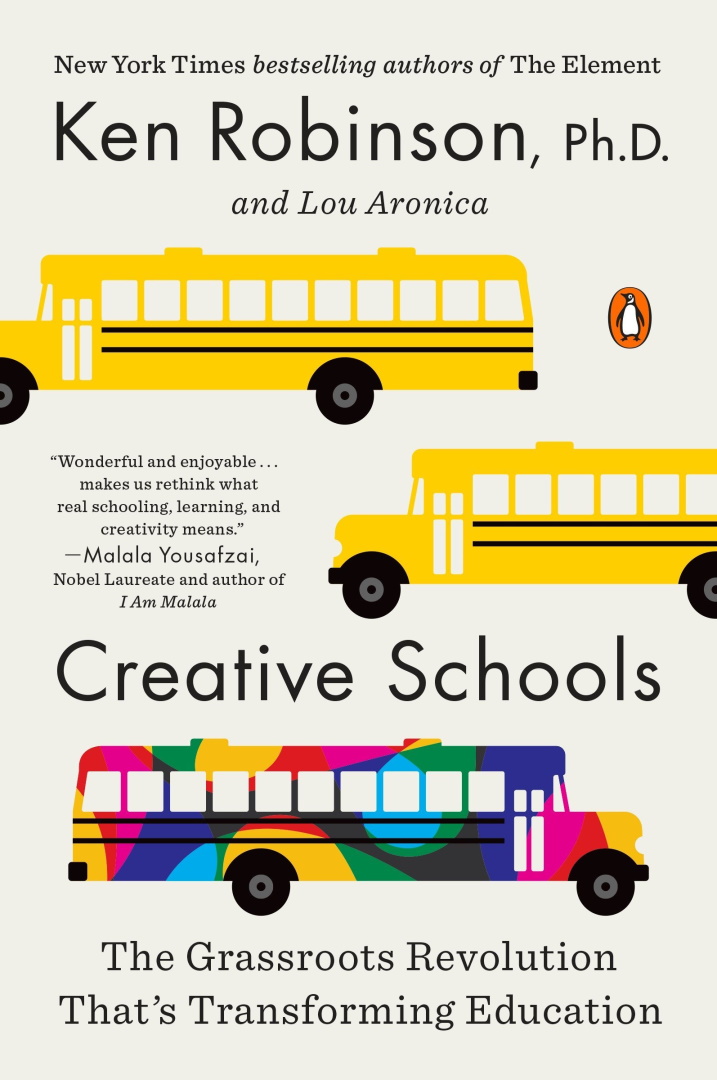“Our role is to create the right conditions for life and learning to flourish. When we do that, we realise we have been in the miracle business all along”
(Sir Ken Robinson)
The Appetizers
There are books you find interesting or fascinating. There are also books that change your life, that while reading them you have the sense that this book will be a life-changer, your mind is ready to blow up with all this extraordinary words and phrases that awaken unknown brain territories of yours. They are like huge buildings with countless doors, and you stand there alone, unable to choose which one to open. Yes, there are books with this effect, at least on me. Then, I open each door with mouth wide open and this curiosity, a curiosity that leads me to other books, other writers, more thoughts, more notes, more mind-boggling complexity. Ken Robinson’s “Creative Schools” was such a book, a life-changer. I read it twice on the spot! I kept notes on the third reading. I treasure it ever since. I adore Robinson’s style: “Are you concerned about education? I am.”, this is the opening of the first chapter. Before the first chapter, I spent some time thinking about the epigram that introduces it: “Civilization is a race between education and catastrophe” –H.G. Wells”. I bought the book after watching the most viewed TEDx talk ever, the one where Ken Robinson explains how schools kill students’ creativity (https://www.youtube.com/watch?v=iG9CE55wbtY) in February, 2006. In August 2020 Ken Robinson left but his books-legacy stayed. They are full of doors for you to open and explore, walk in maples but keep the awe and your spirit high for you can learn so much, be an autodidact, there is no other way to own them.
The Main Course
If you are puzzled how to study Robinson, I think it is better for you to start from his most recent book. The one he wrote but her daughter edited and published. Its title is: “Imagine IF…” (March, 2022, Penguin Random House) and it actually summarises his main points and thoughts offering to us two new chapters to ponder: “creating a future for us all” and “imagine IF…”. These two new chapters propose a sort of grassroots rewilding of education (I love these metaphors). His manifesto will be our main course then, actually, some of his thoughts in his manifesto. First, the importance of imagination. He supports the idea that whatever has been created is the result of human (only?) imagination. He calls it applied imagination and there are three modes of it: the imaginal, the imaginative and the imaginary. Creativity is the application of imagination. It does good to everybody; it makes us feel alive and offers pleasure to our existence. Unfortunately, Robinson assures us that no one takes imagination seriously; no one teaches it or tries to foster it. As he says we “deplete one of the most powerful human resources”.
One of his greatest worries is our future. He identifies eight core competencies we need to cultivate to our learners: curiosity, creativity, criticism, communication, collaboration, compassion, composure and citizenship. His main argument is that our era needs not to reform education but to transform it (p. 50). To do so, he suggests we need to aim at the development of these eight basic, fundamental competencies. These will be our passport to the future.
Finally, he notes that education must be revolutionized from the ground up. He encourages us to be the change, and try to complete the sentence: “Imagine IF…” in any way we see fit to our purpose, as it is an open-ended proposition to future generations, generations we are responsible for. He calls us to rewild education by bringing back or introduce play, imagination, cross-curricular, multidisciplinary approaches of pedagogy into our classroom ecosystem working organically with it.
The Fortune Cookie
I can see you wondering what the connection with ELT is. Perhaps you feel puzzled: “Why should I read a book which is not about language teaching and learning?” you may ask. The technical answer is: because language learning influences the way we perceive the world and life in general, and for this reason any advancement allows us to provide a wider and clearer picture of them to our students (The Sapir-Whorf Hypothesis or Linguistic Relativity- https://www.unitedlanguagegroup.com/blog/the-sapir-whorf-hypothesis-and-languages-effect-on-cognition).
The philosophical answer is that Ken Robinson identifies all our flaws in education and education is not only schooling but also language learning. He calls for a revolution not because he considers himself an anti-conformist but because he realizes that there is time for a paradigm shift and it is better this shift to be organized by the teachers, like you.
